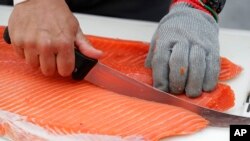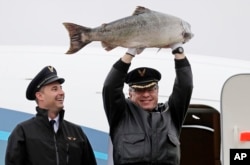Warming waters have reduced the harvest of Alaska's prized Copper River salmon to just a small fraction of last year's harvest, Alaska biologists say.
The runs of Copper River salmon were so low that the Alaska Department of Fish and Game shut down the commercial harvest last month, halting what is usually a three-month season after less than two weeks. Earlier this month, the department also shut down most of the harvest that residents along the river conduct to feed their families.
The total commercial harvest for Alaska's marquee Copper River salmon this year after it was halted at the end of May was about 32,000 fish, the Alaska Department of Fish and Game reported. That compares with the department's pre-season forecast of over 1.2 million and an average annual harvest of over 1.4 million fish in the prior decade.
State biologists blame warming in the Gulf of Alaska for the diminished run of Copper River salmon, prized for its rich flavor, high oil content and deep-red color.
The fish spend most of their lives in the ocean, and those waters were 3 to 5 degrees Celsius (5 to 9 degrees Fahrenheit) warmer than normal, thanks to a warm and persistent North Pacific water mass that climate scientists have dubbed "the Blob," along with other factors, said Mark Somerville, a biologist with the Alaska Department of Fish and Game.
Warmer temperatures caused the metabolism of the fish to speed up, Somerville said. "They need more food for maintenance," he said. "At the same time, their food source was diminished."
Other important salmon runs are also struggling, including those in the Kenai River — a world-famous sport fishing site — and along Kodiak Island. Others have had good numbers, though the returning fish are noticeably reduced in size, Somerville said.
In Alaska, where wild salmon is iconic, Copper River fish hold a special status.
Their high oil content is linked to their ultra-long migration route from the ocean to their glacier-fed spawning grounds. They are the first fresh Alaska salmon to hit the market each year. Copper River salmon have sold for $75 a pound.
Chris Bryant, executive chef for WildFin American Grill, a group of Seattle-area seafood restaurants, worries about trends for Alaska salmon beyond the Copper River.
"The fish are smaller, which makes it harder for chefs to get a good yield on it and put it on the plate," he said.

